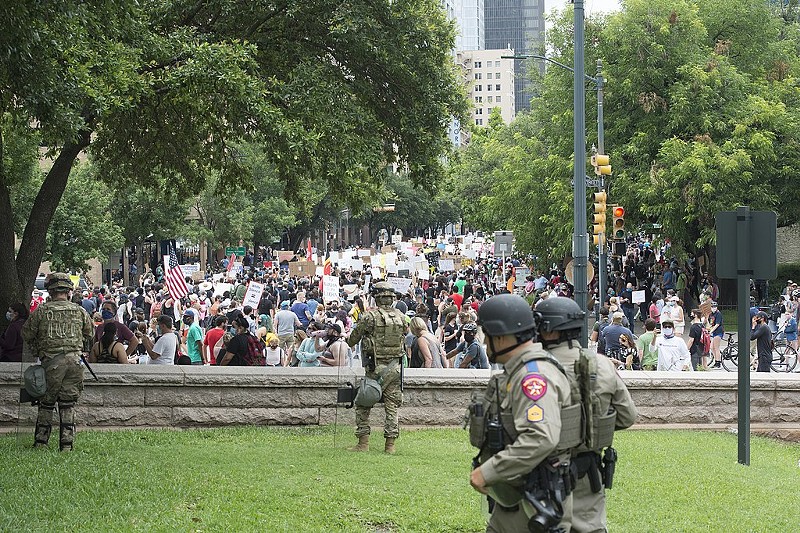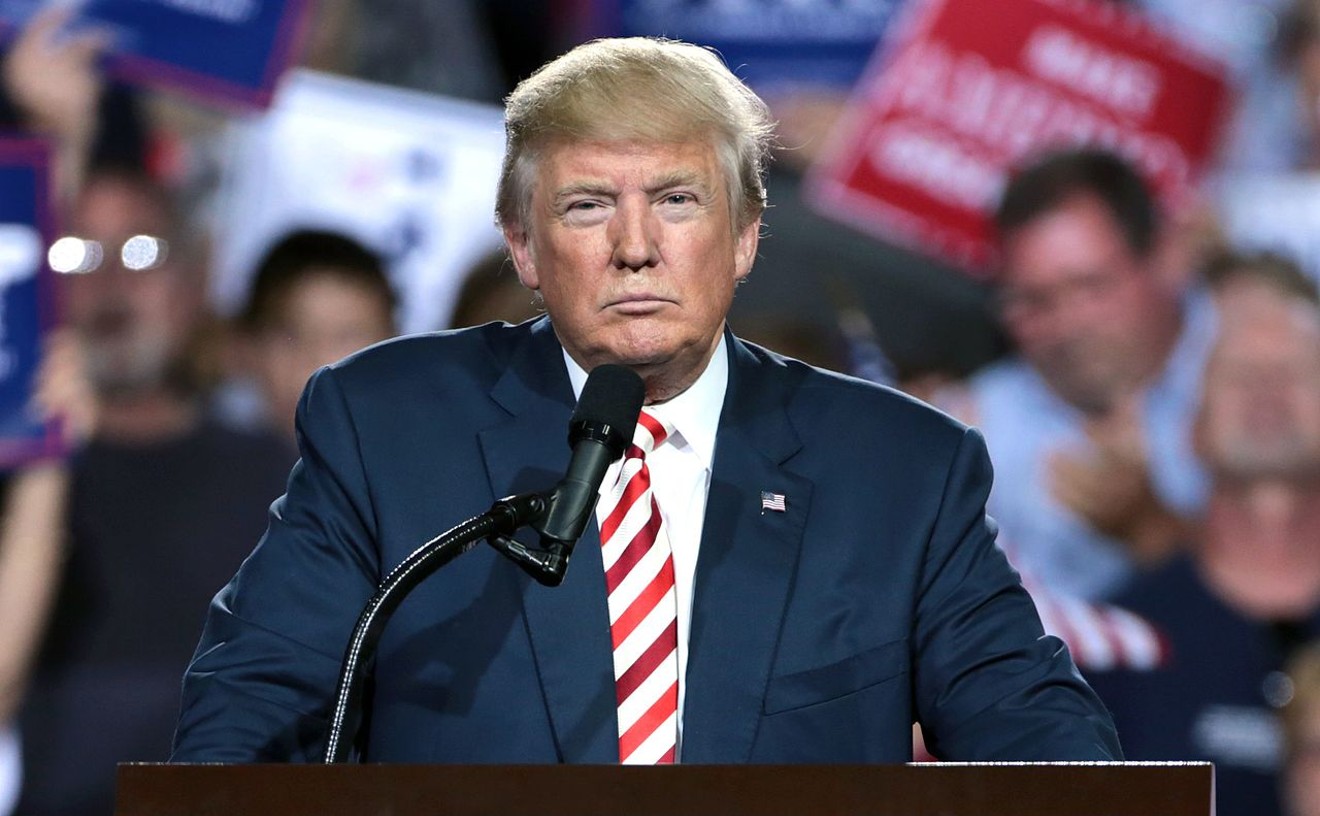It all started last year, while the November elections were still fast approaching. In October, Abbott, Lt. Gov. Dan Patrick, U.S. Sen. John Cornyn and other Texas politicians gathered in Houston to sign the "back the blue" pledge. Facing the prospect of a Democratic flip in Texas, Abbott at the time appeared eager to tap into widespread support among Texans for law enforcement ahead of the vote.
During the Houston conference, the governor ticked off a list of items he hoped to tackle during the next legislative session. Those items included defunding cities that defund the police, stripping cities that defund police of their annexation powers, backing law enforcement who respond to riots and introducing a mandatory minimum sentence for anyone who strikes a cop during a riot ("striking" including shining a laser pointer).
Abbott’s legislative promises came after a summer of protests around the country. Demonstrators had spilled into the streets nationwide after a Minneapolis police officer killed an unarmed Black man named George Floyd last May, and they rallied around the slogan “defund the police.”
In August, when Austin City Council slashed its police budget by $150 million, Abbott threatened to have the Texas Department of Safety take over parts of the Austin Police Department, an expensive and complicated threat he’s yet to make good on.
In September, the governor lashed out at the Dallas City Council for voting to do what he described as defunding the police. The council, however, had only given preliminary support for cutting $7 million from the police department's overtime budget.
In November, Republicans held on to the Texas Legislature. Now, Abbott and a band of loyal Republican legislators are wasting no time pushing full steam ahead with the governor’s back-the-blue agenda.
In March alone, they've filed at least five bills that either punish cities that defund police or seek to enhance penalties for crimes allegedly committed during riots.
Cal Jillson, a political science professor at Southern Methodist University, says the pro-police messaging is a “cheap win” for the governor. “It's the low-hanging fruit, the gift that keeps on giving,” he told the Observer.“It's the low-hanging fruit, the gift that keeps on giving." - Cal Jillson, Southern Methodist University
tweet this
Describing the proposed legislation as “press release bills,” Jillson said that, if passed, many of the bills “won’t have a broad impact." But they offer plenty of political currency. “It's a base strategy from Abbott's perspective,” he said. “It's an easy win both in public opinion and in policy terms.”
Several of the bills have overlapping provisions. Some offer provisions that are already enshrined in law, some read like copies of others recently introduced into the Legislature, and others could have a real impact on protesters accused of rioting.
On March 4, state Rep. Jake Ellzey, a Republican from Waxahachie, introduced a pair of bills he said “protect law enforcement and communities from lawless behavior,” according to a press release.
The first bill, HB 2746, proposes two main provisions. Firstly, anyone who uses a laser pointer and causes “bodily injury” to a police officer could wind up facing a state jail felony. The sentence? Up to two years in jail and a $10,000 fine.
The second provision stipulates that any laser pointer-wielding individual who causes “serious bodily injury” to a law enforcement officer could face a third-degree felony charge. The sentence would be between two and 10 years in prison along with a $10,000 fine.
Texas already has a riot law, but individuals are usually charged with a Class B misdemeanor. Ellzey’s second bill, HB 2747, proposes enhancing rioting to a state jail felony.
“This past year or more we've seen streets become battlegrounds where law enforcement has been attacked by rioters and have been injured by laser pointers,” Ellzey said in the news release. “The people carrying out these crimes need to pay the price for their lawlessness.”
The same day Ellzey introduced his two bills, state Rep. Brad Buckley, a Republican from Salado, filed a bill that aims to enhance punishment for laser pointer-related crimes and to create penalties for using fireworks during protests.
Abbott celebrated Buckley’s bill and urged state legislators to make it law. “During the nationwide riots last summer, rioters used lasers and fireworks to target law enforcement officers, resulting in serious injuries,” Abbott said.“This past year or more we've seen streets become battlegrounds where law enforcement has been attacked by rioters and have been injured by laser pointers." - State Rep. Jake Ellzey
tweet this
“We will not allow this in Texas,” the governor added. “Representative Buckley’s bill will enhance penalties for these criminal acts and help keep law enforcement safe. I encourage the Legislature to pass these much needed protections.”
A day earlier, state Rep. Candy Noble, a Republican from Murphy, filed HB 2695, an emergency-item bill which would punish cities that decide to defund the police.
Under Noble’s legislation, cities that defund the police would see their entire revenue frozen and would be prevented from increasing the revenues as long as the police went unfunded, according to a news release.
That same bill would also allow citizens to bring a lawsuit if their city or county officials yank funding from the local police department.
“Local leaders should know that the consequences are steep and swift if they are found to have willfully compromised the safety of their citizens,” Noble said in the news release.
Last Monday, state Rep. Brooks Landgraf introduced another bill that would enhance penalties for crimes allegedly committed during a riot. Speaking to the Observer, ACLU of Texas’ staff attorney Brian Klosterboer warned that it could have a “chilling effect” on First Amendment rights.
Mark Jones, a fellow in political science at Rice University's Baker Institute, explained that the pro-law enforcement bills "are mostly symbolic," but they give Republicans an opportunity to "go on the offensive against Democrats" after a year of mostly having to defend themselves.
At the same time, Abbott's back-the-blue campaign "drove a wedge" in the Democratic base between the more centrist-minded politicians and the progressive flank. "Republicans have seen it as a good winning issue for them, in that most Americans are pro-law enforcement," Jones said.
But Scott Henson, author of the Grits for Breakfast blog and former policy director at the Innocence Project, thinks the wave of bills is “bullshit.”
“It's all stupid,” he told the Observer. “There are no penalties that need to be enhanced about punishing people who assault police officers. This is 100% about police unions forcing politicians to kiss their rings.”
Abbott’s back-the-blue campaign comes at a time when calls for police reform are growing louder around the country.
In Texas, more than 58% of registered voters have a favorable view of law enforcement, according to a University of Texas/Texas Tribune poll published last October.
But in January, the University of Houston released a poll with a curious conclusion: Texans overwhelmingly supported a number of proposals that would, in effect, reform the police.
The poll found that the George Floyd Act, a sweeping police reform bill spearheaded by the state’s Legislative Black Caucus, enjoyed a 72% support level. The act would drastically restrict a police officer’s ability to use force."This is 100% about police unions forcing politicians to kiss their rings.” - Scott Henson, Grits for Breakfast blog
tweet this
The University of Houston survey also found greater or equal support for each individual provision in the act: banning lethal force if a lesser option is available, barring the use of chokeholds and forbidding no-knock warrants, among others.
Although several of the ideas behind defunding the police are popular, pollsters say the slogan hasn't won over most Americans, according to an analysis published by FiveThirtyEight last summer.
And so the contradiction remains: Many Texans want police reform, but many support Abbott's attacks on efforts to reform the police. Meanwhile, Abbott and his allies in the Legislature will likely push forward protecting the blue from threats big and small, whether they be fireworks or laser pointers.
“There is a lot of political pressure in both directions,” Henson said. “We have a lot more momentum [for police reform] than we had two years ago. At the same time, Governor Abbott's back-the-blue message was very successful during the campaign season last year.”












